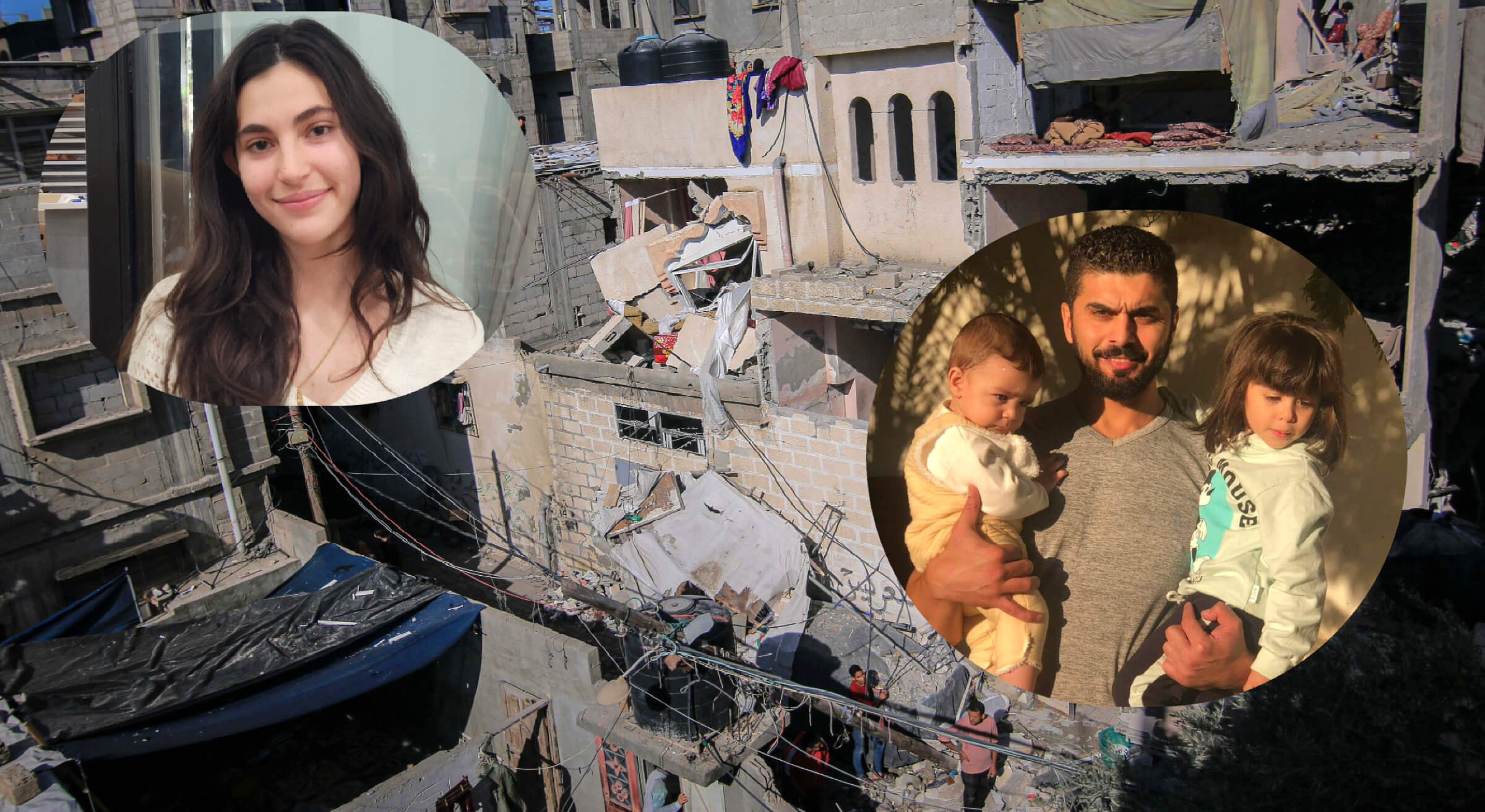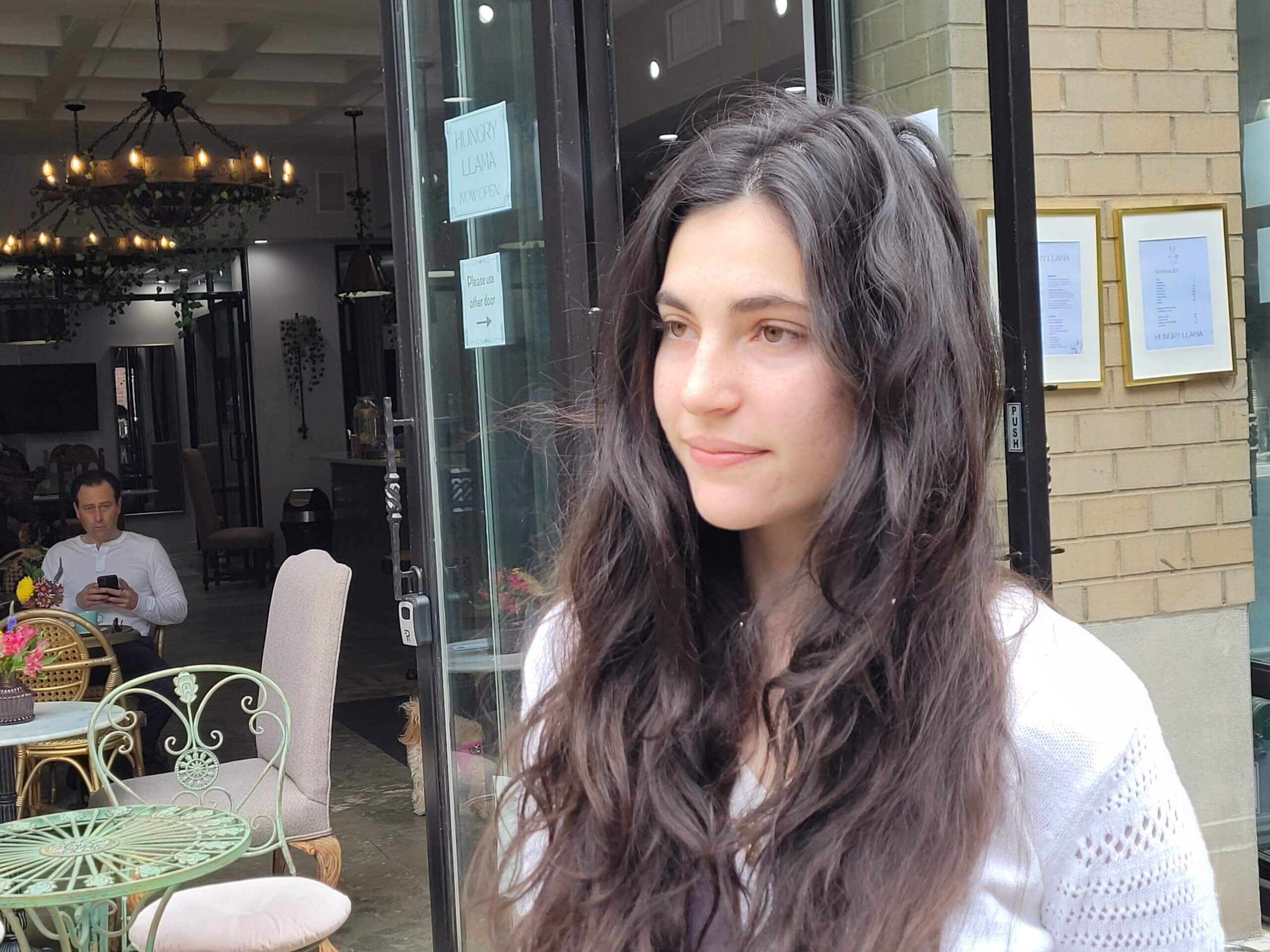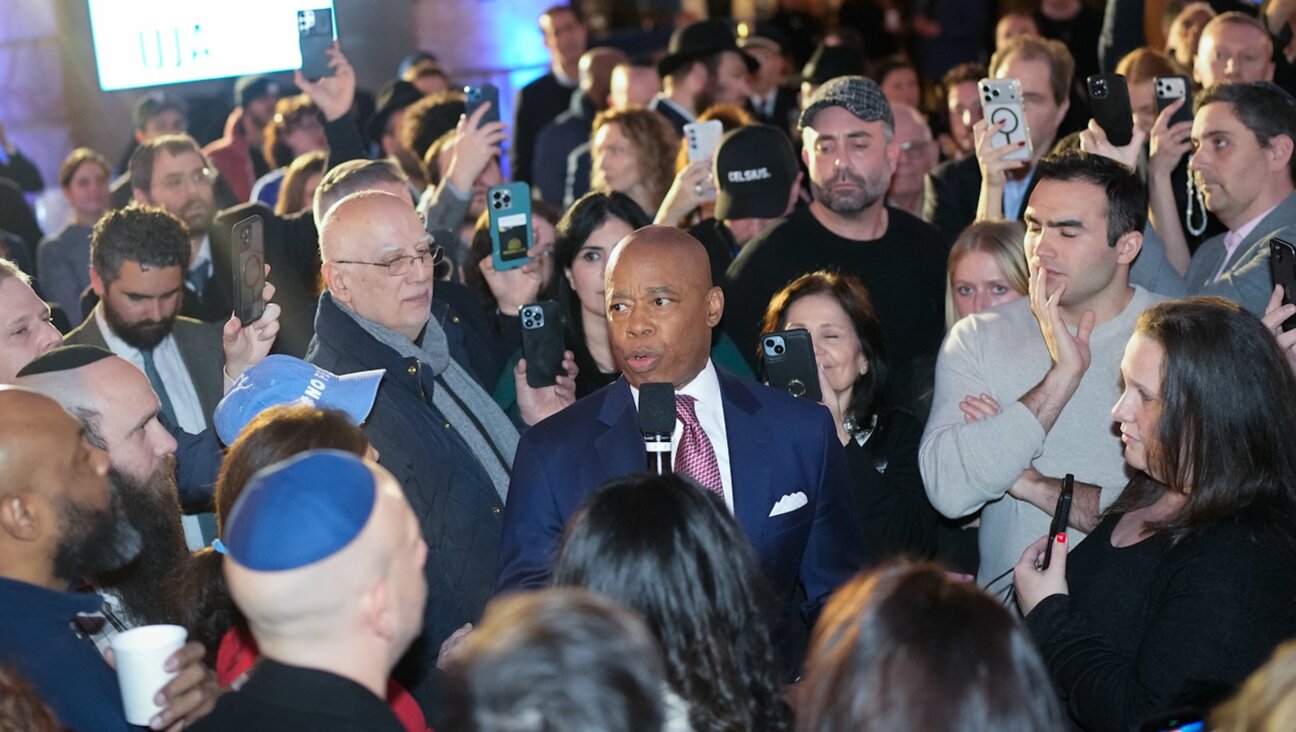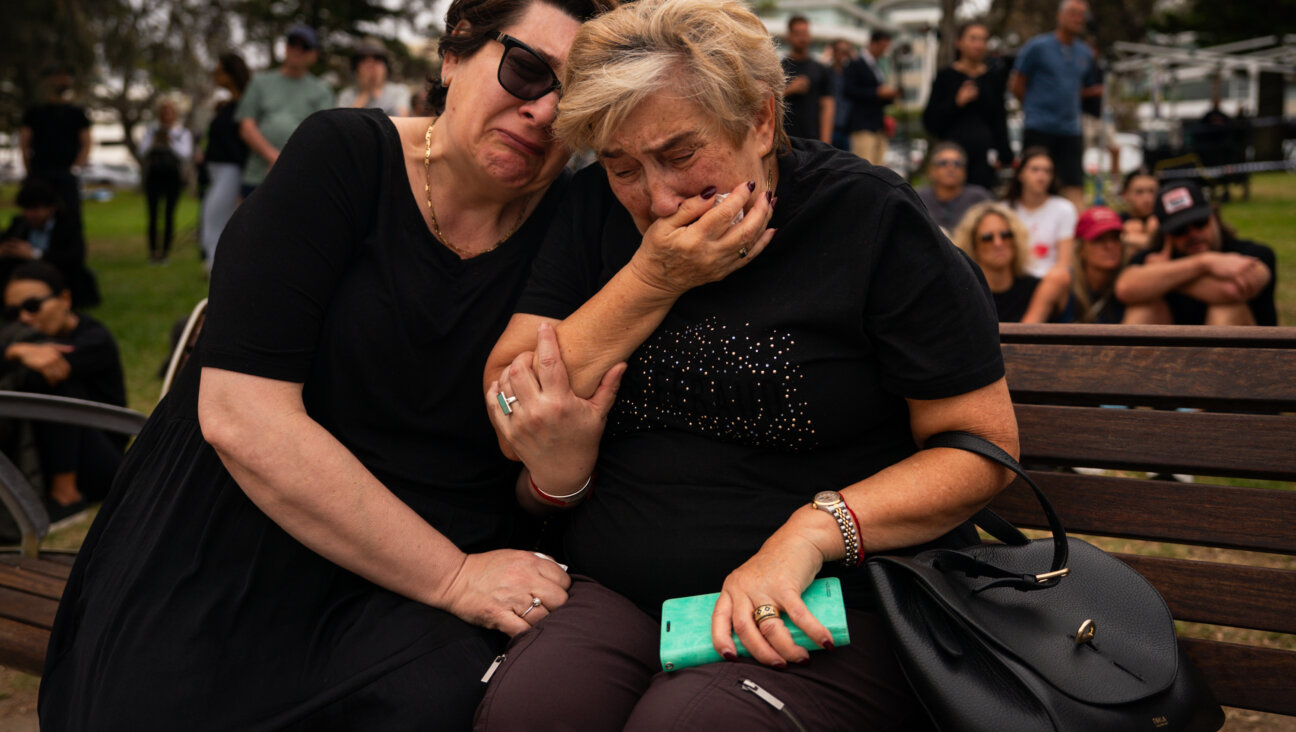‘Somebody’s listening’: Jewish Columbia student leverages social media to help refugees flee Gaza
Makayla Gubbay, who has helped raise about $100,000 for Palestinians to leave Gaza, said she feels connected to the Middle East — but not to Israel

Columbia University student Makayla Gubbay, left, has helped the family of Sara Suleiman, right, raise the money they need to flee the enclave. Pictured are Suleiman’s husband and children. Courtesy of Makayla Gubbay; background photo by Getty Images
Thanks to a Jewish Columbia University student, Sara Suleiman, her husband and two young children have enough money to leave Rafah.
But they are stuck in place as Israel’s offensive in the Southern Gaza city continues. A few weeks ago, intensive ceasefire talks had given the 23-year-old mother and the refugees around her a short-lived hope for peace.
“In Gaza, they prepare sweets,” Suleiman wrote earlier this month to Makayla Gubbay, the student who had raised $15,000 for the family’s safe passage to Egypt by making videos about their plight on Instagram and on TikTok, where Gubbay has about 50,000 followers.

“I am hopeful for you,” Gubbay wrote back on WhatsApp.
Gubbay, just two years younger than Suleiman, has helped raised far more to help others flee Gaza — about $100,000 in total. And through Instagram, she’s founded an informal network to connect about 100 other war refugees to people like her, who manage and promote fundraising campaigns.
“It’s gotten to the point of trying to just help people survive the day,” Gubbay told me.
Gubbay, whose maternal grandfather was Israeli, is a human rights major at Columbia, the epicenter of the campus protest movement against Israel’s military campaign in Gaza. In recent years she has researched her heritage, strengthening her ties to the Middle East — but not to Israel — and fueling her desire to help people in Gaza.
“Helping to rebuild the lives of Palestinians in Gaza and getting to know so many families on a deeply personal level, I have connected with the region in a way I never have before,” said Gubbay, a rising senior at Columbia who was raised in San Diego.
She has taken part in pro-Palestinian protests and spent time in Columbia’s “Gaza Solidarity Encampment,” which was dismantled last month after university officials called in the New York City police.
But Gubbay said she is not a leader in the movement. She instead centers her activism online — a project that began in the early days of the war with one particular refugee, the teenage cousin of a Palestinian friend in New York.
A young computer scientist
Noor Al-Din Felfel, 16, was studying computer science at the Islamic University of Gaza before the war. Now he is organizing a tent distribution and a solar energy project to provide shelter and power to other refugees.
“He’s someone that I feel like in a different life could have been my classmate here,” said Gubbay. “And it’s crazy to think that he’s in the situation he’s in.”
Gubbay decided to help him and his family raise the money needed to escape. She set up a successful English-language fundraising campaign and managed social media pages to bring their story to a Western audience.
Noor and his family, who remain in northern Gaza, had just paid a travel company the necessary fees — several thousand dollars per person — and registered to enter Egypt when fighting reignited in early May and the border closed. Like the Suleimans and other refugees who have the money to flee, they are still trapped in Gaza.
Israel controls the border crossings, and fighting continues both in the north and south of the enclave. Though Israel has not launched the full offensive in Rafah it has said it needs to root out Hamas, it has expanded operations there in recent weeks.
”They’re still just really hoping that the border will open again and they’ll be able to evacuate,” Gubbay said.
After Felfel’s GoFundMe took off, word spread among other refugees. Gubbay started getting hundreds of messages asking for help, and finding herself overwhelmed, reached out to match them with volunteers like her who could boost their fundraising campaigns and share them through their social media channels.
One of those people who messaged her was Suleiman, the married mother of a daughter, 4, and a son, 2. They formed a fast friendship online and began talking to each other through WhatsApp. Gubbay said she herself would help her. Suleiman, Gubbay recalled, told her that she was happy to have her as he first non-Muslim friend.
She was feeling “like the world had kind of abandoned her and her family, like everyone had left,” Gubbay said. “She’d been posting for months and just been getting nothing.”
The donations picked up after Gubbay began making videos about the Suleiman’s story on Instagram and on TikTok, where Gubbay has about 50,000 followers. The videos range from pleas for aid, to dispatches from the family’s refugee camp, to Gubbay speaking directly to camera about the Suleimans’ situation.
Family tree
Gubbay connects her efforts to help refugees in Gaza to her own family’s long and complex history in the Middle East.
As a child, she knew there was a conflict between Israelis and Palestinians, but few details beyond that. From her maternal grandfather, an Israeli who died two years ago, she heard vague references to a violent history she did not fully understand.
He was descended from Ottoman Jews who lived alongside Muslims and Christian Arabs in Jerusalem for generations before the British Mandate. He spoke Hebrew, Arabic and Ladino, a form of Judeo-Spanish spoken by Jews expelled from Spain in 1492, and felt connected both to Israel and the family’s non-Jewish neighbors, Gubbay said.
Her family was “kind of Arab in a way,” even though her grandfather was “Israeli at his core,” Gubbay said. “Israel was everything to him.”
His granddaughter, who has never been to Israel, did not inherit his allegiance to it.
“I always felt this disconnect between what I knew from my grandfather, and what I was hearing from people around me,” Gubbay said. “Like I always grew up with friends that were quite pro-Palestine.”
She learned more about her background during her first two college years at Sciences Po in Reims, France, as part of a dual degree program with Columbia. Her classmates seemed to know much about their family histories, and it made her want to learn about her own — and to share her search online.
She started a TikTok account, where she posted about her grandparents — both her Israeli grandfather and her paternal grandfather, an Indian Jew of Iraqi descent. She made videos about uncovering her Middle Eastern roots, including old family recipes, and how she feels drawn to the region — but can’t find her place within it.
“Where would I even go?” she asked in one video. “Israel does not feel like home to me. And there is no Jewish community left for me in Iraq.”
Responses to her posts came from the curious, the ignorant and the outright hostile. One commenter wanted to know, given her Israeli heritage, how she could claim any other.
Another asked, “Are you trying to colonize Iraq now too?”
After the attack
When Hamas militants attacked Israel on Oct. 7, killing 1,200 and abducting 240, Gubbay’s first thoughts were for great aunts and uncles and second cousins living in Israel. She reached out to make sure they were fine, and watched videos of the violence on social media. It was horrific and shocking, she said.
Then, her thoughts turned to what would come next — an Israeli attack on Gaza.
“I knew that at the end of the day, innocent people were going to pay the price,” she said.
Its military campaign has displaced 1.7 million people and killed more than 35,000, according to the United Nations.
To flee, money must be paid to an Egyptian travel company whose owner has close ties to Egyptian President Abdel Fattah el-Sissi.
If you’re not lucky enough to have the money to begin with, Gubbay said, “you have to go on social media, and basically plead for your life that someone funds your family.”
Gubbay said she can help refugees share their stories in a way that will get people to open their wallets. But she serves another purpose, she added.
“I can also provide some comfort,” she said. “They know somebody’s listening, somebody’s trying.”
















